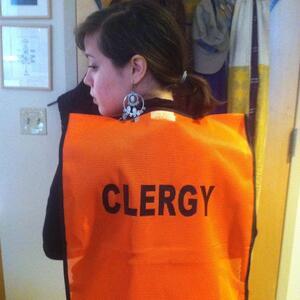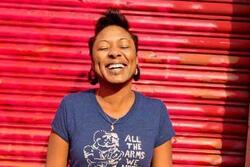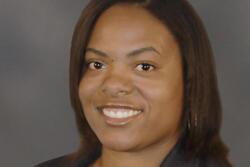One Year Since Ferguson: An Interview with Activist Sarah Barasch-Hagans
Sarah Barasch-Hagans is a rabbinical student and activist who has been deeply involved in the fight for justice for Black Americans in Ferguson, Missouri. Her new venture, Fargesn Media, seeks to give a voice the people of Ferguson and empower them to tell their own story. Sarah spoke to JWA about Jewish activism, her experiences in Ferguson since last August, and where we as a community should go from here.
Sarah, thank you for talking to JWA about your work. Can you start by telling us about how your Judaism informs your activism?
Every single bit of why I live and love for justice in St. Louis and America and Israel and Palestine is absolutely, inextricably bound up in my Jewishness. It’s my history, language, ancestry, narrative, sense of time and routine, food, rhythm—it’s my entire framework. The ideas that inform me are Jewish and many of the people that guide me are too. When asked why Fargesn Media is Jewish, I want to say "Because it was my idea and I am Jewish. Because it was inspired by the need to amplify the theology of my Black Jewish relatives. Because it was named by a sermon from a fellow queer rabbi, Rabbi Mike Rothbaum, who like me is married to a Black man. Because it is caught up in the past in such a Jewish way, never sure which time period it speaks from . . . just like us." Of course, Jewish narrative tradition is just as valid as any other. No further explanation needed.
On a similar note, how does feminism factor in to your activism?
I was raised in a tradition of feminist activism by a mother who was a public health nurse in the rural American South. My mother’s experience working for reproductive and sexual health on behalf of society’s most vulnerable women gave me a robust and healthy skepticism about power and authority, knowing that the decisions made on behalf of women were often illogical and unjust, and that women’s bodies were often a playing field for men’s political maneuvers.
In college, my activism on behalf of rape survivors was my first direct experience with the brokenness of the justice system. I went to college in a city with a police department that had never prosecuted a rape charge brought by any of the students in my school, and yet profiled Black men and boys for simply walking around our campus. I knew the latter events happened, but I did not know as much about the former. My experiences with sexual violence and the institutional refusal to stop it taught me firsthand how bound up women’s liberation was with racial injustice. How could a society so built on criminalizing people of color be so intent on protecting white men who brutalized my friends?
I realize now that I am inclined to join movements that are led and inspired by female and queer leadership. I trust these leaders more and I prefer to be in these communities. In my involvement in St. Louis/Ferguson #BlackLivesMatter movement, I am led by and in partnership with Black women and Trans* People. Black women in particular are incredibly marginalized in this country, yet required to appear “strong” in the face of everything. This breaks my heart and makes me angry. I have decided that my first priority is to support the Black women who have put everything on the line for this movement to be on the right side of history.
As a rabbinical student, you have a unique perspective on history and faith. Can you tell us about the connections between your rabbinical studies and the social justice movement?
Jewish classical texts are nearly all based on central questions of what it means to be a community. From the Torah to the Talmud and on, we debate and discuss how to structure our cities, our time, our food, and our behavior to live the most ethical and holy lives we can, all based on this incredible conviction that every single person has the spark of God in them. This is a radical and inspiring worldview that I hold very dearly.
At the same time, Jewish history keeps us painfully in touch with the darkest parts of humanity. And sometimes our own behavior, particularly our desire to blend in for safety or to reenact our trauma on others, keeps us painfully in touch with the scariest parts of ourselves. So while our texts offer us an incredibly moving vision of the world we could create, our reality keeps us from ever being naive about how difficult it will be.
The more I study our history and our values, I am convinced that the fullest expression of my Judaism is to pursue justice. I don’t just pray by performing activism, I pray while I do the activism. I repeat the Shema in my head in front of police in riot gear. I remember the Jews of the Warsaw Ghetto Uprising—including the teenage girls who rose up too are rarely invoked—when I am most afraid. Their courage makes me remember that sometimes, risks are worth taking.
Can you tell us about your experience protesting in Ferguson?
I was not surprised about the racism because I had worked on racial justice issues in St. Louis since I was 16, but I was surprised that St. Louis was the place to rise up this time. Many of my friends were joining the protests, and the things they reported were absolutely terrifying. Their treatment by the police was nothing short of the dystopian novels I read in high school—but this wasn’t fiction. I knew these streets. I knew these people. And my government was literally attacking them with chemical weapons for protesting a lynching—for protesting someone’s child being left to die in the intense summer sun for 4 hours and 32 minutes. Whatever idealism I still had was completely gone by August 10, 2014.
On October 9, an off-duty police officer hired to patrol a wealthy street had ventured off the street and murdered a 17-year-old boy named Vonderrit Myers who was walking home to his grandmother’s house with his friends, just like Michael Brown had been. The officer said he had a gun, but suspiciously there was no DNA on the gun. Vonderrit was shot in the back many times. Nothing about the story made sense. It was outrageous.
That night, we marched for hours, but when we got to the business district, the St. Louis City police showed up. They maced many of my friends in front of the hip coffee shop where I’ve been on many dates. They penned people in and shot them with tear gas and rubber bullets while we watched from a hundred yards away. A woman had a seizure in the street and it took an hour for them to let the ambulance in to check on her. They brought a tank and spoke on the bullhorn. I felt like I was in a war zone but all we had were signs and banners.
But the next morning, none of this was in the paper. Just the police chief’s report of broken windows and that they got the crowd under control. No acknowledgment that no one was hurt by a single protestor yet many were hurt by those our tax dollars employed—and that they did so with weapons outlawed by the Geneva Convention.
In a sense, my understanding of Jewish history prepared me for this experience. And yet, of course, nothing could have ever truly prepared me.
Is your social justice work connected to the civil rights movement of the 1960s?
Yes, I have studied the history of the Civil Rights Movement extensively and it gives me a great deal of hope. That movement lasted over a decade, which tells me that we are only beginning to see the progress we will make. It also reminds me to preserve myself and take care of my loved ones because we are in this for the long haul.
Additionally, my discovery of the formative grassroots leadership of a gay man named Bayard Rustin and a woman named Ella Baker is what has committed me to preserving the stories of women and queer people this time around so that no one has to “discover” them in the future. I want my friends to be credited for their contributions right now and not written out of history.
What role should Jews take in the wake of Ferguson?
People of conscience should discern their role in seeing, understanding, and dismantling systemic racism in our country. It is our most American poison, and it is killing Black people and killing the souls of everyone whose heart is hardened by agreeing to live with these injustices. White people, including White Jews, should take a support role to the leadership of people of color. They should practice active listening without interruption and do whatever is actually asked of them by leaders of color.
Solidarity means making sacrifices. It means actually wanting a world where we won’t be privileged because we’re white. It means supporting movements with our money, bodies, and willingness to be uncomfortable. Donate, stand in front of the riot line, and talk to other white people about why this matters to you—and to humanity. This fight will not be won by good intentions.
How should we remember Ferguson on the one-year anniversary of Michael Brown’s death?
We should honor this time by dedicating ourselves to changing the Fergusons of America. Ferguson is still a difficult place to be Black and the rest of St. Louis is incredibly racist and segregated. The police here still act exactly as they did last August, but now the national media isn’t here to monitor them. We have precious little infrastructure and a very difficult time fundraising to support any type of truly grassroots or progressive work. And the amount of destitute poverty in this city is astounding. It should enrage us all.
I feel that the rest of the country used the pain of my loved ones to start a national conversation and then left when they took all we could give. I realize now that we in St. Louis will have to save ourselves. I am hopeful because they same brave people who woke up the world still live here and they are still working hard. But they are very tired. Many of them are still poor. Many of them lost their jobs and do not have stable housing.
I ask that those who want to support us spend some time to reflect on their role in history since August 9, 2014. And then, please find a Black-led organization to support with your time and money. I can suggest plenty here in St. Louis who are still working very hard.







Sarah's current project is the FARGESN MEDIA PROJECT, and can be found at www.fargesn.com